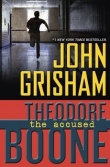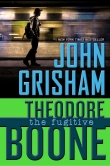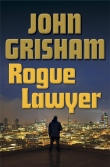
Текст книги "Gray Mountain"
Автор книги: John Grisham
Соавторы: John Grisham
Жанры:
Политические детективы
,сообщить о нарушении
Текущая страница: 9 (всего у книги 27 страниц)
12
The hike began at the end of a long-abandoned logging trail no one but Donovan could have possibly found. The drive getting there required the skill and nerve of a stunt driver, and at times Samantha was certain they were sliding into the valley. But he made it to a small opening heavily shaded with oak, gum, and chestnut, and said, “This is the end of the road.”
“You call that a road?” she said as she slowly opened her door. He laughed and said, “It’s a four-lane compared to some of these trails.” She was thinking that life in the big city had done nothing to prepare her for this, but she was also thrilled at the thought of adventure. His only advice had been to “wear boots to hike in and neutral clothing.” She understood the boots, but the clothing required an explanation.
“We have to blend in,” he said. “They’ll be watching for us and we’ll be trespassing.”
“Any chance of getting arrested again?” she had asked.
“Slim. They can’t catch us.”
The boots had been purchased the day before at the dollar store in Brady—$45 and a bit stiff and tight. She wore old khakis and a gray sweatshirt with “Columbia Law” across the front in small letters. He, on the other hand, wore green hunter’s camouflage and state-of-the-art, mail-order hiking boots with a thousand miles on them. He opened the rear hatch of the Jeep and removed a backpack which he slung over his shoulders. When it was in place, he removed a rifle with a large scope. When she saw it she said, “Hunting, are we?”
“No, it’s for protection. A lot of bears in these parts.”
She doubted that, but was not sure what to believe. For a few minutes, they walked a trail that someone had used before, but not often. The incline was slight, the undergrowth thick with sassafras, redbud, foamflower, and red catchfly, plant life he casually pointed out as if fluent in another language. For her benefit, he moved at an easy pace, but she knew he could sprint up the mountain anytime he wanted. Soon she was panting and sweating, but she was determined to stay on his heels.
It was mandatory for all single professionals in the city to own a gym membership, and not just any gym. It had to be the right one—the right place and the right outfit, the right time of the day or night to be seen sweating and grunting and getting properly toned for $250 a month. Samantha’s membership had collapsed under the ruthless demands of Scully & Pershing, had expired two years earlier, and had not been missed in the least. Her workouts had been reduced to long walks in the city. Those, along with light eating habits, had kept the weight off, but she was far from fit. The new boots grew heavier with each turn as they zigzagged upward.
They stopped at a small clearing and looked through the woods into a long, deep valley with mountain ridges in the distance. The view was spectacular, and she appreciated the break. He waved an arm and said, “These are the most biodiverse mountains in North America, much older than any other range. Home to thousands of species of plants and wildlife not found anywhere else. It took an eternity for them to become what they are.” A pause as he soaked in the scenery. Like a tour guide who needed no prompting, he went on. “About a million years ago, coal began to form, seams of it. That was the curse. Now we’re destroying the mountains as fast as possible to extract it so we can have all the cheap energy we can eat. Every person in this country uses twenty pounds of coal per day. I did some research into coal usage per region; there’s a Web site. Did you know that the average person in Manhattan uses eight pounds of coal each day that comes from strip-mining here in Appalachia?”
“Sorry, I didn’t know that. Where do the other twelve pounds come from?”
“Deep mines here in the East. Ohio, Pennsylvania, places where they mine coal the old-fashioned way and protect the mountains.” He sat his backpack on the ground and pulled out binoculars. Through them he scanned the view and found what he wanted. He handed them to her and said, “Over there, at about two o’clock, you can barely see an area that’s gray and brown.” She looked through the binoculars, focused them, and said, “Okay, got it.”
“That’s the Bull Forge Mine in West Virginia, one of the largest stripping operations we’ve seen.”
“I read about it last night. They had a little trouble a few months back. Some truck tires were used as target practice.”
He turned and smiled at her. “Doing your homework, huh?”
“I have a laptop and it can find Google in Brady. The ecoterrorists struck again, right?”
“That’s what they say.”
“Who are these guys?”
“Hopefully, we’ll never know.” He was standing slightly ahead of her, still gazing in the distance, and as he spoke his left hand instinctively reached back an inch or two and touched the stock of his rifle. She barely caught it.
They left the clearing and began the real climb. The trail, when there was one, was barely discernible, and Donovan seemed not to notice it. He went from tree to tree, looking ahead for the next landmark, glancing down to check his footing. The hike became steeper and Samantha’s thighs and calves began to ache. The cheap boots pinched the arches of her feet. Her breathing was labored, and after fifteen minutes of silent climbing she said, “Did you bring any water?”
A rotting log made a pleasant resting place as they shared a bottle. He didn’t ask how she was doing and she didn’t inquire as to how much longer they would hike. When they caught their breath, he said, “We’re sitting on Dublin Mountain, about three hundred feet from the top. It’s next door to Enid Mountain, which you’ll see in a few minutes. If all goes as planned, in about six months Strayhorn Coal will bring in the dozers, thoroughly scalp this mountain, destroy all of these beautiful hardwoods, scatter all the animals, and start blasting away. Their application for a strip-mining permit is nearing approval. We’ve fought it for two years, but the fix is in.” He waved an arm at the trees and said, “This will all be gone before we know it.”
“Why not at least harvest the trees?”
“Because they’re brutes. Once a coal company gets the green light, it goes crazy. They’re after the coal, dammit, and nothing else matters. They destroy everything in their path—forests, timber, wildlife—and they run over anyone who gets in their way: landowners, local residents, regulators, politicians, and especially activists and environmentalists. It’s a war, with no middle ground.”
Samantha looked at the dense forest and shook her head in disbelief. She said, “It can’t be legal.”
“It’s legal because it’s not illegal. The legality of mountaintop removal has been litigated for years; it’s still in the courts. But nothing has stopped it.”
“Who owns this land?”
“Strayhorn does now, so we’re trespassing, and, believe me, they would love to catch me up here, three days before the trial. Don’t worry, though, we’re safe. For about a hundred years this land was owned by the Herman family. They sold out two years ago and built a mansion on a beach somewhere.” He pointed to his right and said, “There is an old family home just over that hill, about half a mile down the valley, been in the family for decades. It’s abandoned now, empty. It’ll take the bulldozers about two hours to level the house and outbuildings. There’s a small family cemetery under an old oak not far from the house, a little white picket fence around the graves. Very quaint. It’ll all be shoved down the valley—headstones, coffins, bones, whatever. Strayhorn doesn’t give a damn and the Hermans are rich enough to forget where they came from.”
She took another sip of water and tried to wiggle her toes. He reached into his backpack, removed two granola bars, and handed her one. “Thanks.”
“Does Mattie know you’re here?” he asked.
“I’m living under the assumption that Mattie, and Annette and Barb and probably even Claudelle, know just about every move I make. As you like to say, ‘It’s a small town.’ ”
“I’ve said nothing.”
“It’s Friday afternoon and things were slow around the office. I told Mattie you asked me if I wanted to go sightseeing. That’s all.”
“Good, then we went sightseeing. She doesn’t need to know where.”
“She thinks you should settle the lawsuit, to at least get something for the mother of the two boys.”
He smiled and took a large bite. Seconds passed, then a full minute, and Samantha realized that long gaps in conversation did not make him uncomfortable. Finally, he said, “I love my aunt, but she knows nothing about litigation. I left her little legal clinic because I wanted to do big things, take on big lawsuits, get big verdicts, make big coal companies pay for their sins. I’ve had big wins and big losses, and like a lot of trial lawyers I live on the edge. Up and down. Flush one year and broke the next. I’m sure you got a taste of that as a kid.”
“No, we were never broke, far from it. I was aware that my father sometimes lost, but there was always plenty of money. At least, until he lost it and went to prison.”
“What was that like, from your standpoint? You were a teenager, right?”
“Look, Donovan, you’re separated from your wife and you don’t want to talk about it. Fine. My father went to prison and I don’t want to talk about it. Let’s make a deal.”
“Fair enough. We should move on.”
They trekked upward, slower and slower as the trail disappeared and the terrain became even steeper. Pebbles and stones trickled behind them as they grabbed saplings to pull themselves up. At one point, as they stopped to catch a breath, Donovan suggested that Samantha take the lead so that he could catch her if she stumbled and slid backward. She did so, and he stayed close, with one hand on her hip, sort of guiding, soft of shoving. Finally they reached the summit of Dublin Mountain, and as they emerged from the forest into a small, rocky clearing, he said, “We have to be careful here. This is our hiding place. Just over those rocks is Enid Mountain where Strayhorn is hard at work. They have some security guys who occasionally pay attention to this area. We’ve been in litigation for over a year, and we’ve had a couple of nasty altercations.”
“Such as?”
He removed his backpack and leaned his rifle against a rock. “You’ve seen the photographs in my office. The first time we came here with a photographer they caught us and tried to press charges. I ran to the judge and got an order which allowed us access on a very limited basis. After that, the judge told us to stay off their property.”
“I haven’t seen any bears. Why the rifle?”
“Protection. Get down and come here.” They crouched and walked a few steps to a gap between two boulders. Below them lay the remains of Enid Mountain, which in years past rose to thirty-two hundred feet, but was now reduced to a pockmarked landscape of dust and rock and crawling machinery. The operation was vast, stretching from the remains of the mountain and jutting over the ridges around it. Mining trucks hauling a hundred tons of fresh, unwashed coal bounced along a myriad of switchbacks, descending steadily like ants marching mindlessly in formation. A massive dragline the size of her apartment building swung back and forth, its bucket clawing into the earth and digging out two hundred cubic yards of overburden and dumping it into neat piles. Loaders with smaller buckets worked methodically to scoop it up and dump it into another fleet of trucks that hauled it to an area where bulldozers shoved it down the valley. Lower on the mountain, or the mine site, track shovels dug coal from the exposed seam and dumped it into the mining trucks that slowly inched away when loaded, straining under their cargo as they bounced along. Clouds of dust hung over every phase of the operation.
Donovan, in a low, somber voice as if he might be overheard, said, “Quite a shock, huh?”
“ ‘Shock’ is the right word,” she said. “Mattie showed me three strip mines on the way to Colton on Wednesday, but we were not this close. Kinda makes you sick.”
“Yes, and you never get used to it. It’s an ongoing rape of the land, a new assault every day.”
The violence was slow, methodical, and efficient. After a few minutes, he said, “In two years, they’ve knocked off eight hundred feet of the mountain. They’ve gone through four or five seams, with about that many left to strip. When it’s over, Enid Mountain will yield about three million tons of coal, at an average price of sixty bucks a ton. The math gets easy.”
They huddled close together, careful not to actually touch, and watched the desolation. A bulldozer shoved a load perilously close to the edge, and the larger rocks tumbled down a wall of fill a thousand feet in height. The rocks bounced and fell until they were out of sight far below. He said, “And that’s how it happened. Try and imagine the mountain about five hundred feet higher, where it was nineteen months ago. That’s when one of those dozers pushed the boulder that traveled almost a mile before it hit the trailer where the Tate boys were asleep.” He found his binoculars and began searching, then handed them to her. “Stay low, now,” he said. “Far down in the valley there, beyond the fill, you can barely see a little white building. Used to be a church. Got it?”
After a few seconds she said, “Got it.”
“Just beyond the church there was a tiny settlement of a few houses and trailers. You can’t see it from here. As I said, it’s about a mile away and the trees are blocking the view. At trial, we plan to show a video that reenacts the path of the boulder. It actually flew over the church, probably at about eighty miles an hour, based on its weight, and bounced once or twice, then banged into the Tate trailer.”
“You have the boulder?”
“Yes and no. It weighs six tons, so we will not be hauling it into the courtroom. But it’s still there and we have plenty of photographs. Four days after the accident, the coal company tried to remove it with explosives and machinery, but we were able to stop them. Thugs, nothing but thugs. They actually showed up with a full crew the day after the funeral, entered onto property they had no claim to, and were all set to dismantle the boulder, regardless of how much damage they did to everything else. I called the sheriff and there were some tense moments.”
“You had the case four days after the accident?”
“No, I had the case the day after the accident. Less than twenty-four hours. I got to the mother’s brother. You have to be quick out here.”
“My father would be impressed.”
Donovan glanced at his watch and looked at Enid Mountain. He said, “They’re scheduled to blast at 4:00 p.m., so you’re in for some excitement.”
“Can’t wait.”
“You see that odd-looking truck with a tall boom attached to the rear, over there to the far left?”
“Are you kidding? There are a hundred trucks.”
“It’s not a haul truck; it’s much smaller. All by itself.”
“Okay, yes, I got it. What is it?”
“Don’t know if it has an official name, but it’s known as the blasting truck.” With the binoculars, Samantha zeroed in on the truck and the busy crew around it. “What are they doing?”
“Right now, they’re starting to drill. The regulations allow them to go down sixty feet with a blast hole that’s seven inches in diameter. The holes are ten feet apart, sort of in a grid. The regulations limit them to forty holes per blast. Regs here and regs there, lots of rules on the books. Not surprisingly, they are routinely ignored and companies like Strayhorn are accustomed to doing whatever they want. No one is really watching, except for maybe an environmental group here and there. They’ll take a video, file a complaint, the company gets a nuisance fine, a slap on the wrist, life goes on. The regulators are drawing their checks and sleeping peacefully.”
A large bearded man crept silently behind them and slapped Donovan on the shoulders with a loud “Boom!” Donovan yelled, “Shit!” as Samantha yelped and dropped the binoculars. Stricken, they wheeled about and gasped at the grinning face of a burly man you wouldn’t want to fistfight. “Sonofabitch,” Donovan hissed without reaching for his rifle. Samantha desperately looked for an escape trail.
The man stayed low and laughed at the two. He stuck out a hand in Samantha’s direction and said, “Vic Canzarro, friend of the mountains.” She was trying to catch her breath and unable to extend a hand.
“Did you have to scare the hell out of us?” Donovan growled.
“No, but it sure is fun.”
“You know him?” Samantha asked.
“Afraid so. He’s a friend, or more of an acquaintance, actually. Vic, this is Samantha Kofer, an intern with Mattie’s legal clinic.” They finally shook hands. “A pleasure,” Vic said. “What brings you to the coalfields?”
“It’s a long story,” she said, exhaling, heart and lungs now working. “A very long story.”
Vic dropped a backpack and sat on a rock. He was sweating from the trek up and needed water. He offered a bottle to Samantha but she declined. “Columbia Law?” he asked, looking at her sweatshirt.
“Yes. I worked in New York until ten days ago when the world crashed and I got laid off or furloughed or something like that. Are you a lawyer?” She sat on another rock where Donovan joined her.
“Hell no. I used to be a mine safety inspector but managed to get myself fired. It’s another long story.”
“We all have long stories,” Donovan said, taking a bottle of water. “Vic here is my expert witness. Typical expert—pay him enough and he’ll tell the jury anything you want. Next week he’ll spend a long day on the stand having a delightful time clicking off a never-ending list of Strayhorn Coal’s safety violations. Then the defense lawyers will eat his lunch.”
Vic laughed at this. “I’m looking forward to it,” he said. “Going to trial with Donovan is always exciting, especially when he wins, which is not very often.”
“I win as many as I lose.”
Vic wore a flannel shirt, faded jeans, boots caked with old mud, and had the look of a veteran hiker who could whip out a tent from his backpack and spend the next week in the woods. “Are they drilling?” he asked Donovan.
“Just started, supposed to blast at four.”
Vic checked his watch and asked, “Are we ready for trial?”
“Oh, yes. They doubled their offer this afternoon to two hundred thousand. I countered at nine-fifty.”
“You’re crazy, you know that? Take the money and get something for the family.” He looked at Samantha and asked, “Do you know the facts?”
“Most of them,” she said. “I’ve seen the photographs and maps.”
“Never trust a jury around here. I keep telling Donovan this but he won’t listen.”
“Are you filming?” Donovan asked, changing the subject.
“Of course.” They chatted for a few minutes as both men kept glancing at their watches. Vic removed a small camera from his backpack and took a position between two boulders. Donovan said to Samantha, “Since the inspectors are not watching, it’s safe to assume Strayhorn will break a few rules when they start blasting. We’ll catch it on video, and maybe show it to the jury next week. It’s not that we really need it, because we have so much dirt on the company. They’ll put their engineers on the stand and they’ll lie about how closely they follow all regulations. We’ll prove otherwise.”
He and Samantha eased into positions next to Vic, who was filming and lost in his work. Donovan said, “They fill each hole with a concoction known as ANFO—an acronym for a combination of ammonium nitrate and fuel oil. It’s too dangerous to transport so they mix it on the site. That’s what they’re doing now. That truck is funneling diesel fuel into the blast holes while that crew to the left there is rigging up the blasting caps and detonators. How many holes, Vic?”
“I count sixty.”
“So they’re clearly in violation, which is typical.” Samantha watched through binoculars as men with shovels began backfilling the blast holes. A wire ran from the top of each one and two men were busy gathering them into a bundle. Sacks of ammonium nitrate were dropped into the blast holes, which were topped off with gallons of diesel fuel. The work was slow; 4:00 p.m. came and went. Finally, when the blasting truck backed away, Donovan said, “It won’t be long now.” The grid was cleared as the crews and trucks disappeared. A siren sounded and that area of the site became still.
The explosions were a distant rumble as plumes of dust and smoke shot into the air, each blast only a split second after the one before it. The plumes rose in perfect formation, like fountains in a Vegas water show, and the earth began to crumble. A wide swath of ancient rock fell in violent waves as the ground shook. Dust boiled from the blast site and formed a thick cloud above it. With no wind, the cloud hung over the rubble with nowhere to go. Much like a play-by-play announcer, Donovan said, “They’re blasting three times a day. Their permit allows only twice. Multiply all of this by dozens of active surface mines, and they’re using about a million pounds of explosives every day here in coal country.”
“We got a problem,” Vic said calmly. “We’ve been spotted.”
“Where?” Donovan asked, taking the binoculars from Samantha.
“Up there, by the trailer.”
Donovan focused on the trailer. On a platform next to it, two men with hard hats were apparently watching them through their own binoculars. Donovan waved; one of the men waved back. Donovan shot him the bird; the man returned the greeting.
“How long have they been there?” he asked.
“Don’t know,” Vic said. “But let’s get outta here.” They grabbed their backpacks and the rifle, and began a hurried descent down the mountain. Samantha slipped and almost fell. Vic caught her and kept her hand tight in his. They followed Donovan, ducking around trees, dodging boulders, clawing through underbrush, with no trail visible. After a few minutes, they stopped in a narrow open area. Vic pointed and said, “I came in this way. Call me when you get to your Jeep.” He disappeared into the woods, and they continued downward. The trail was not as steep and they managed to carefully jog for a few hundred yards. “Are we okay?” Samantha finally asked.
“We’re fine,” he said calmly. “They don’t know the trails like I do. And if they catch us they can’t kill us.”
She found little comfort in that. They picked up speed as the trail continued to flatten. The Jeep came into view a hundred yards away and Donovan paused for a second to search for other vehicles. “They haven’t found us,” he said. As they drove away, he sent a text to Vic. All was clear. They bounced down the mountain, dodging holes and ravines wide enough to swallow the Jeep, and after a few minutes he said, “We’re no longer on Strayhorn’s property.” He turned onto a paved road just as a large, dust-covered pickup truck raced around a curve. “That’s them,” he said. The truck moved to the middle of the road to block the Jeep, but Donovan hit the gas and passed it on the shoulder. At least three rough-looking characters in hard hats were in the truck, scowling and looking for trouble. They stopped abruptly and began turning around to give chase, but the Jeep left them behind.
Racing through the back roads of Hopper County, Donovan kept one eye on his mirror and said nothing. “Do you think they got your license plate number?” she asked.
“Oh, they know it’s me. They’ll run to the judge Monday morning and cry like babies. I’ll deny it all and tell them to stop whining. Let’s pick a jury.”
They passed the courthouse on Center Street in Colton. Donovan nodded in its direction and said, “There it is. Ground zero. The ugliest courthouse in Virginia.”
“I was there Wednesday, with Mattie.”
“Did you like the courtroom?”
“It’s kind of weird, but I’m not much of an expert on courtrooms. I’ve always tried to avoid them.”
“I love them. It’s the only place where the little guy can go toe-to-toe on a level field with a big, crooked corporation. A person with nothing—no money, no power—nothing but a set of facts can file a lawsuit and force a billion-dollar company to show up for a fair fight.”
“It’s not always fair, is it?”
“Sure it is. If they cheat, then I cheat. They play dirty, I get even dirtier. You gotta love justice.”
“You sound like my father. It’s frightening.”
“And you sound like my wife. She has no stomach for the work I do.”
“Let’s talk about something else.”
“Okay, do you have plans for tomorrow?”
“Saturday in Brady. The clinic is closed, so what are my options?”
“How about another adventure?”
“Does it involve guns?”
“No, I promise I will not carry a gun.”
“Will we trespass on someone’s property? Is there a chance of getting arrested?”
“No, I promise.”
“Sounds pretty dull. I’m in.”








